
Contributor
Contributor
Caitlyn Martyn is a freelance writer whose work has appeared in Byrdie, InStyle, Popsugar and more.

Medical review by
Scott Nass, M.D., MPA, FAAFP, AAHIVS
Board-certified Family Physician
Scott Nass, M.D., MPA, FAAFP, AAHIVS is a family physician and HIV specialist in California. He takes a holistic approach to healthcare, incorporating principles of functional medicine and using food as medicine when working with patients.
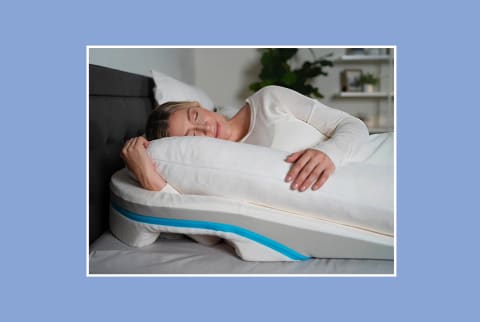
March 24, 2023
Our editors have independently chosen the products listed on this page. If you purchase something mentioned in this article, we may
Whether you’re temporarily recovering from an injury, have perpetual pain due to hunching over a desk, or land somewhere in between, the best pillow for shoulder pain can make a world of a difference in the quality of sleep you get, and can help you experience less pain during waking hours. The right pillow for shoulder pain is one that offers adequate support, without contorting your body into a position that will cause more harm than good.
To learn more about the best pillows for shoulder pain, we tapped Benjamin Torres, DPT, certified physical therapist. Below, find our selections, in addition to his expert advice on what to look for and how to get the most comfortable, restorative sleep out of your pillow.
What type of pillow is best for shoulder pain?
The pillow best for shoulder pain is one that supports your body. “Side sleeping pillows should be firm (rather than soft) and big enough to fit your full head on it,” Torres adds. “If you’re sleeping on your back, a thinner pillow that slides all the way under to the neck is best to avoid rounded shoulders and neck.”
What are common causes of shoulder pain?
According to research, shoulder pain is one of the most common regional pain syndromes, impacting up to 26% of adults at any given time1. “The two most common pathologies of the shoulder are rotator cuff injuries (tendinitis or tears) and impingement syndrome,” Torres explains. “The rotator cuff consists of four muscles that work together to act like a steering wheel to the shoulder and is critical for movement and control. Impingement syndrome is when a tendon (or soft tissue structure) starts pinching within the shoulder joint (and oftentimes involves the rotator cuff). “Both are painful and can be troublesome for athletic and everyday activities,” he adds.
While injury and overuse are typically to blame for shoulder pain, a few small2 studies3 have linked shoulder pain with spending a prolonged period of time sleeping on a surface that’s too firm, particularly if you’re a side sleeper. Pro tip: while you’re evaluating your sleeping environment, you might consider investing in a mattress for shoulder pain, too.
How pain impacts your sleep:
Your pillow can play a large role in shoulder pain, primarily because sleep plays a large role in shoulder pain—and without the right pillow, you won’t get a good sleep. “For one, your body recovers during sleep and quality rest is critical for healing,” Torres says. “Secondly, the posture in which your shoulder sits for six to eight hours during your sleep cycle can easily create pain during the night and linger into the following day.” So, a pillow that encourages proper shoulder and neck posture is important for shoulder health, quality sleep, and overall comfort.
How to choose the best pillow for shoulder pain:
Ready to buy a pillow of your own? Consider these factors when choosing the best pillow for shoulder pain:
Firmness
Our expert emphasizes that firmness is one of the most important factors to consider when purchasing a pillow. Go with one that is firm enough to support your body.
Shape
Since there are a few different sleep styles (side, back, stomach, or combination), you’ll want to look for a shape that allows your body to comfortably rest against it in whichever position you choose.
Materials & thickness
Pick a pillow that feels comfortable against your neck. Focus on high-quality materials that prop your head up, without feeling like you’re over extending yourself.
How we picked:
A pillow needs to be thick enough to support the head and keep the spine neutral. Your ideal thickness will depend on the position you spend the most time sleeping in, so we’ve provided options for back, stomach, and side sleepers.
Each pillow we’ve selected has positive feedback from people who have personally tested them.
Those with shoulder pain will need a pillow that stays supportive and holds its shape over time. We sifted through tons of customer reviews to find the ones that can hold up to years of use.
We used our expert’s advice and insights to guide our selection process.
Our picks for the best pillow for shoulder pain of 2023:
Best memory foam: Tempur-Pedic TEMPUR-Cloud Adjustable Pillow

Pros:
- Customizable firmness
- Ideal for all sleep positions
Material: PolyesterFoam
Sizes available: QueenKing
This pillow offers the plush, cloud-like feel of memory foam, while also being entirely adjustable. That’s right, you can fluff, scrunch, flatten, and even remove filling to customize the shape and firmness. The brand’s proprietary material adapts to your shape, weight, and temperature for the most optimal fit. The surface is incredibly breathable (it features an open cellular structure that allows for natural airflow through the pillow), so even if you run hot, you’ll feel comfortable resting on this pillow. Best of all, those with shoulder pain love the extra support this pick offers for the head and neck.
As expected, this pillow is a favorite among shoppers who tend to feel discomfort while sleeping. “These pillows arrived quickly and have been wonderful! They provide good support but are not too firm,” a happy customer writes. “My husband and I both have neck issues, and these pillows have helped that. I’m a side sleeper and my old pillow has been hurting my ears at night. We’re both sleeping better now.”
Best cooling: Brooklyn Bedding Luxury Cooling Memory Foam Pillow
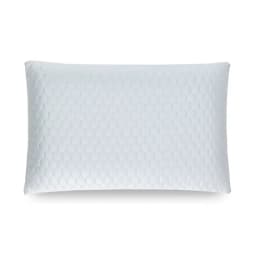
Pros:
- Supports unique shape of head, shoulders, and neck
- Cooling
- Smooth cover
Material: Latex
Sizes available: QueenKingHigh and Low loft
Made from fast-response memory foam, this luxury cooling pillow reacts quickly to pressure and conforms to the shape of your head, neck, and shoulders. What’s more, the pillow features a ventilated fabric for increased airflow and a cooling effect. In fact, the cool gel surface draws heat out and away from your head while you sleep.
The pillow’s knit cover is silky smooth—but some say it’s slippery, so you may want to enlist the help of a zippered pillowcase. Choose from two heights: low (4 inches) or high (5 inches). Back and stomach sleepers will likely enjoy the low elevation, while side sleepers could benefit from the extra elevation.
“This is by far the best pillow I have ever slept on,” one reviewer says. It has tremendous support. I thought it was too hard at first, but after the first night’s sleep, I was sold. For several weeks now, I sleep like a baby and experience less restlessness. It keeps the perfect temperature.”
Advertisement
This ad is displayed using third party content and we do not control its accessibility features.
Best for rotator cuff pain: MedCline Shoulder Relief System
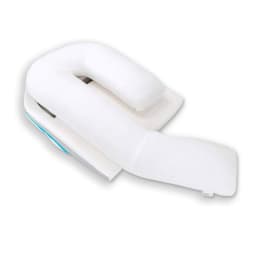
Pros:
- Multiple size options
- Designed for side sleepers
- Creates neutral arm position
Cons:
- Takes time to break in
- Not meant for those with herniated disks, lumbar damage, or other hip and back injuries
Material: Gel-infused foam
Sizes available: SmallMediumLarge
Recommended for rotator cuff injuries, arthritis, nerve impingement, tendonitis, or general shoulder pain, this pillow features a gel-infused foam for pain relief and support. The brand’s patented arm pocket is designed specifically for side sleeping. Your purchase includes an inclined wedge, which elevates the upper body 10 degrees to take the pressure off of your downside arm and shoulder; an insert pillow; therapeutic body pillow; and a set of removable, washable pillowcases.
The foam takes about 30 nights to break in and meld to your body, during which time you can experiment with different positions. Just keep in mind, the elevation isn’t ideal for those with herniated disks, bulging disks, fused vertebrae, scoliosis, or lumbar damage, arthritic hips, bursitis in the hips, or hip injuries, as the angle could be too much to tolerate.
“This system is a miracle for me. I have a neck and shoulder injury as well as reflux. I haven’t slept well in at least 15 years, rarely getting four hours all night,” one shopper shares. “I’ve tried every pillow out there and was pretty skeptical when I bought this pillow. But, it cradles my head, shoulder, and arm so well that I’m actually sleeping for eight hours straight—I can’t believe it.”
Best for all sleepers: Coop The Original Pillow
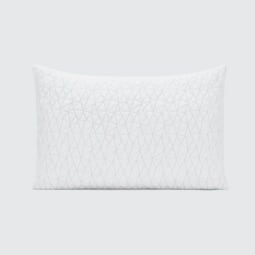
Pros:
- Hypoallergenic fill
- Supportive
- Adjustable
Cons:
- Takes time to break in
Material: PolyesterMemory foamMicrofiber
Sizes available: QueenKing
Whether too plush or too flat, the wrong pillow firmness can be enough to keep you up at night. According to Torres, adjustable pillows are a great way to find the perfect firmness level. He recommends this specific pillow to his patients—and he uses it himself. “I like that you can select the amount of support by changing the contents of what’s inside manually,” he elaborates.
If you like a plush pillow, sleep on it as is. To flatten it a bit, take some filling out. Either way, you’ll enjoy the hypoallergenic pillow’s firm support, memory-foam comfort, and breathable, temperature-regulating fabric. The only caveat is that the pillow takes a week or two to completely break in.
“This is the best pillow I’ve ever owned; it’s genuinely improved the quality of my sleep,” one customer writes. “Since using it, I’ve noticed that I wake up in the middle of the night less often, and when I do, I fall back asleep extremely easily. Definitely worth the investment!” Another says that it made a huge difference in her pain management. “The relief of my pain was almost instant. I’ve tried almost 20 pillows and this is the best,” she adds.
Advertisement
This ad is displayed using third party content and we do not control its accessibility features.
Best for side sleepers: Eli & Elm Cotton Side-Sleeper Pillow
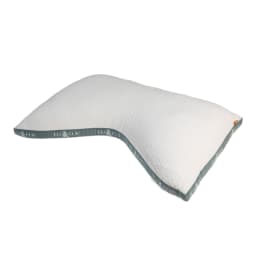
Pros:
- Designed specifically for side-sleepers
- Conforms to head and neck
Material: PolyesterCottonSpandexLatex
Sizes available: Standard
Designed specifically for side sleepers, this pillow from Eli & Elm conforms to your head and neck shape, allowing for a unique fit that offers proper support. Side sleepers require a bit of plushness to hold their heads up, and this pillow offers that and more. In fact, the U-shaped design is made to alleviate neck pain and promote spinal alignment. Similar to the Coop pillow, it can be adjusted to suit your desired height. All you have to do is unzip the pillow and remove some of the filling.
Shoppers rave about how great it is at managing all sorts of aches and pains. “I absolutely love this pillow! I was experiencing horrible neck and shoulder pain with other pillows,” a customer writes. “I was desperate to find a side sleeper pillow that would give me relief. After just a few nights in this pillow, I had so much less pain. After a week, none!”
Best for back sleepers: Nest Bedding Easy Breather Pillow
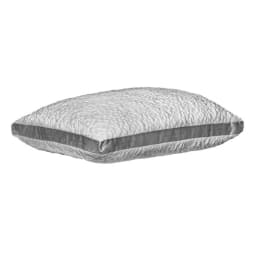
Pros:
- Cooling
- Soft feel
- Multiple size options
Cons:
- Too firm for some
- Memory foam
Material: PolyesterFoamCottonSpandex
Sizes available: StandardQueenKingSide sleeper
Back sleepers will love this firm-yet-comfortable pillow. It features an eco-friendly cover, with a foam filling that’s contouring and supportive. This is another adjustable pick, which can be customized to your preferences by taking some filling out. It arrives a bit overstuffed, with the idea that it’s better to have more (and be able to take more out).
This pillow is a particularly great choice for back sleepers, but all other types of sleepers will enjoy how flexible and adjustable it is. “After using it for a couple months, this pillow was exactly what I needed. It gives me the back support I need, but can move the filling out of the way if I want to flip onto my stomach,” one reviewer writes.
Advertisement
This ad is displayed using third party content and we do not control its accessibility features.
Best eco-friendly: Sweet Zzz Plant-Based Pillow
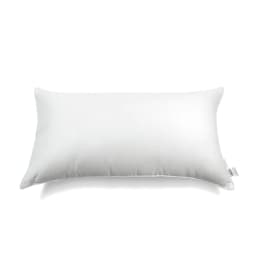
Pros:
- Plush outer layer, firm inner layer
- Natural and sustainable materials
Material: Plant-based downCotton
Sizes available: StandardKing
This natural, plant-based down fill pillow offers a plush feel for comfort and pressure relief, with a firm base for contouring and support. Designed for optimal air circulation, this pick is cooling and temperature-regulating. The cover is made from 100% naturally-derived cotton, so it’s sensitive skin-friendly (and certified as safe for babies, too). The brand donates 1% of every purchase to 1% for the Planet, an organization dedicated to giving back to environmental causes.
This pillow is a crowd-pleaser for back, stomach, and side sleepers. “I sleep on my side most of the time and my husband sleeps on his back, but we both like this pillow,” one shopper says. “Usually I end up returning pillows that are too soft, causing my head to sink in too much or too firm to the point that my head hurts. This pillow feels soft and comfortable but as soon as you lay your head on it, it feels very supportive.” Best of all, reviewers say this pillow maintains its feel and shape through nightly use.
FAQ:
What kind of pillow is good for shoulder pain?
According to Torres, a pillow that offers the ideal balance of support and comfort is best for shoulder pain. Just remember that your sleeping position matters, too. “Side sleepers shouldn’t let their shoulders lie directly under the body while sleeping,” he says. A firm pillow is helpful because it helps prop the head, neck, and shoulders up and offer necessary support. Torres adds that, “Back sleepers, on the other hand, should use a thinner pillow that slides all the way under the neck to avoid rounded shoulders.”
How should I sleep to reduce shoulder pain?
According to our expert, sleeping on your back is best, if you can. If that’s not an option, Torres recommends lying on the side opposite the pain. “Try to rest on a firm pillow that keeps the neck in neutral; you should be able to draw a straight line from the top of your head down the spine.”
Could my pillow be causing my shoulder pain?
The posture in which your shoulder sits for six to eight hours during your sleep can absolutely create pain that lingers into the following day, says Torres. Setting your posture with a body pillow is a great way to avoid sleeping-induced shoulder pain.
Is a memory foam pillow good for shoulder pain?
While not the most sustainable material, memory foam can offer shoulder, neck, and head support while you sleep, making it a great option for those with persistent pain. This type of material retains heat, so hot sleepers might prefer something with added cooling properties.
The takeaway.
No matter what position you sleep in, the right pillow can help ease shoulder pain throughout the night. The best pillow for shoulder pain is one that supports your body and helps it stay in a comfortable position as you lay still for several hours. Though pillows can’t eliminate your shoulder pain completely, they can help while you’re seeking treatment. To continue upgrading your sleep, check out the best mattresses for shoulder pain and try these shoulder stretches to ease your discomfort.
